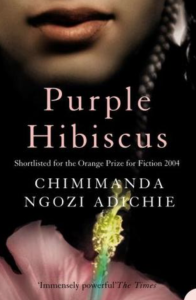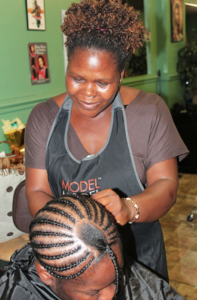For my passion blog for the spring semester I will be reviewing and analyzing a new book each week. Some I read over the summer, some I read over break, and some I will read during the duration of this semester.
The first book I will be discussing is one of my all time favorites, Americanah by Chimamanda Ngozi Adichie. If you’ve read my blog from the fall, you know I’ve brought her name up several times either from her presence in Beyonce’s Flawless or from my favorite TED talk, which you should seriously watch.
Chimamanda Ngozi Adichie is an African writer born in Nigeria on September 15, 1977. She was the fifth out of six children to Igbo parents, Grace Ifeoma, and James Nwoye Adichie. Adichie grew up in Nsukka. Her father worked at the University of Nigeria as the first professor of statistics, who later became Deputy Vice-Chancellor of the University. Her mother was the first woman registrar at the University of Nigeria. She completed her secondary education at the school attached to the University. She studied medicine and pharmacy at the University of Nigeria. At nineteen, she left to study in the United States. She studied communication at Drexel University for two years, then studied communication and political science at Eastern Connecticut State University. She completed a master’s degree in creative writing from Johns Hopkins. During her time at Eastern Connecticut State University she wrote her first novel Purple Hibiscus,  which won much critical acclaim. She now divides her time between Nigeria and the United States.
which won much critical acclaim. She now divides her time between Nigeria and the United States.
Americanah tells the story of a strong-willed Nigerian woman Ifemelu, who leaves her home in Nigeria for American to pursue her studies. She endures years of near poverty before graduating from college, starting a blog, and winning a fellowship at Princeton, before coming full circle and returning to Nigeria. Americanah is about being black in the 21st century. It’s about first love. It’s about growing up. It’s about returning home. Adichie examines how blackness functions in America, Nigeria, and Britain, but Americanah is not only a novel about race, it also attempts to understand universal human experience.
Ifemelu and Obinze meet and fall in love in Nigeria, while in high school, stay together through university until striking in Nigeria cause them to pursue education elsewhere. These characters are not those of stereotypical African poverty. They do not flee war or starvation. They leave for choice and opportunity. Obinze heads to Britain, while Ifemelu travels to America. When they do reunite many years later back in Nigeria nothing is like they remember. It’s about the universal experience of leaving home and creating home in your mind. But home is constantly changing and you are constantly changing when you leave home. Soon enough you are different and home is different so its not home anymore.
They do not flee war or starvation. They leave for choice and opportunity. Obinze heads to Britain, while Ifemelu travels to America. When they do reunite many years later back in Nigeria nothing is like they remember. It’s about the universal experience of leaving home and creating home in your mind. But home is constantly changing and you are constantly changing when you leave home. Soon enough you are different and home is different so its not home anymore.
The story is told in flashbacks through both Obinze’s and Ifemelu’s point of view from their school days growing up to modern day until they eventually meet again in Nigeria. When we first meet Ifemelu, she’s having her hair braided at an African salon in Trenton, NJ.  She has to travel a great distance just to find a hair salon that get work with her hair. Right away hair serves as a greater metaphor about black experience in America. Ifemelu does not chemically treat her hair to match the white standard of beauty in America. This is especially relevant because until recently, the U.S. military did not recognize natural black hair as acceptable. But at this point, she is a successful writer, but she has to travel to a poor predominately black neighborhood. But this wasn’t always the case. Ifemelu chemically treats her hair until her scalp burns. Eventual she comes to the revelation and embraces her natural hair Ifemelu reclaims her own African identity.
She has to travel a great distance just to find a hair salon that get work with her hair. Right away hair serves as a greater metaphor about black experience in America. Ifemelu does not chemically treat her hair to match the white standard of beauty in America. This is especially relevant because until recently, the U.S. military did not recognize natural black hair as acceptable. But at this point, she is a successful writer, but she has to travel to a poor predominately black neighborhood. But this wasn’t always the case. Ifemelu chemically treats her hair until her scalp burns. Eventual she comes to the revelation and embraces her natural hair Ifemelu reclaims her own African identity.
Ifemelu’s journey in America is directed by experiences of race that wouldn’t seem new to black Americans, but they’re new to her. Ifemelu’s experiences eventually manifest into a blog entitled, “Raceteenth or Various Observations About American Blacks (Those Formerly Known as Negroes) by a Non-American Black.” She makes astute revelations about the way race unconsciously seems into our daily existence. Her observations are particularly sharp because as she notes, “I don’t think of myself as black and I only became black when I came to this country.” Race confuses her because it is an imaginary construct with actual consequences. Race dictates and drives her life in America, but Ifemelu notices that white Americans are scared about talking about race and often claim that it doesn’t exist.
“In America, racism exists but racists are all gone. Racists belong to the past. Racists are the thin-lipped mean white people in the movies about the civil rights era. Here’s the thing: the manifestation of racism has changed but the language has not. So if you haven’t lynched somebody then you can’t be called a racist. If you’re not a bloodsucking monster, then you can’t be called a racist. Somebody has to be able to say that racists are not monsters.”
Ifemelu unapologetically describes the more nuanced racism she experiences that one wouldn’t understand unless you experienced it. Here are some more articles that further explain this notion. Adichie presents the uncomfortable realities of our life right in front of our face. It is always genuine. She doesn’t try to sugar coat it because the life of a black person in America is not sugar coated.
 It is even in the process of becoming a movie staring Lupita Nyong’o. This novel describes the human experience of growing up and leaving home and finding love and yourself. It also describes race how it functions in the U.S. because as black people living in America, race centrally dictates their life.
It is even in the process of becoming a movie staring Lupita Nyong’o. This novel describes the human experience of growing up and leaving home and finding love and yourself. It also describes race how it functions in the U.S. because as black people living in America, race centrally dictates their life.

